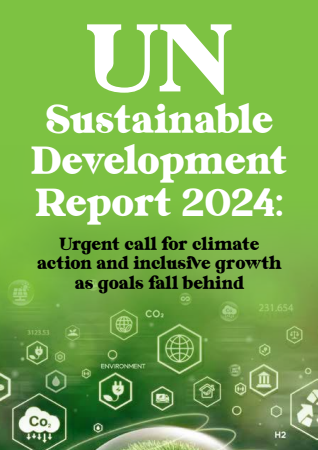UN Sustainable Development Report 2024: Urgent call for climate action and inclusive growth as goals fall behind

Ahead of the UN Summit of the Future in September 2024, the United Nations released the Sustainable Development Report 2024. This report is a comprehensive roadmap towards achieving the Sustainable Development Goals (SDGs) by 2030. It underscores the urgency of collective action to address global challenges such as climate change, inequality, and environmental degradation. The report outlines progress towards the 17 SDGs, identifying gaps and proposing actionable strategies. It highlights the interconnectedness of these goals and the necessity of integrated approaches to ensure sustainable and inclusive growth. In a nutshell, the report highlights that none of the 17 SDGs are on track to be achieved by 2030, and only an estimated 16% of the SDG targets are progressing.
One of the central themes of the report is the urgent need for climate action. The report calls for enhanced efforts to reduce greenhouse gas emissions, emphasising the role of the private sector in adopting sustainable practices. Businesses are encouraged to invest in clean energy, improve energy efficiency, and innovate in low-carbon technologies. Policy frameworks could support these transitions through incentives, subsidies, and regulatory measures that promote green investments. The report stresses the importance of shifting towards sustainable consumption and production patterns. For businesses, this means rethinking supply chains, reducing waste, and optimizing resource use. Governments can facilitate this shift by enacting policies that promote circular economy principles, such as extended producer responsibility and sustainable public procurement. Collaboration between the public and private sectors is vital to creating markets for sustainable products and technologies.
Addressing inequalities is another critical aspect of the 2024 report. The private sector has a significant role in fostering inclusive growth by creating decent jobs, ensuring fair wages, and promoting diversity and inclusion. On this end, the aim is to create an enabling environment for businesses to thrive while ensuring that economic benefits are widely shared. This includes investing in education, healthcare, and social protection systems to build a more equitable society.
The report advocates for policies that align economic incentives with sustainability goals. This includes carbon pricing, pollution taxes, and subsidies for renewable energy and sustainable agriculture. Regulatory certainty is crucial for businesses to plan long-term investments in sustainable technologies and practices. Public-private partnerships (PPPs) are highlighted as a key mechanism for driving sustainable development. By leveraging the strengths of both sectors, PPPs can mobilize resources, expertise, and innovation to address complex challenges. Innovation is at the heart of achieving the SDGs. The report underscores the need for investments in research and development (R&D) to drive technological advancements. Businesses should focus on developing and deploying technologies that enhance sustainability, such as renewable energy, energy storage, and precision agriculture.
The report calls for enhanced global cooperation to address transboundary challenges such as climate change, biodiversity loss, and pandemics. Businesses operating in global markets need to align their strategies with international sustainability standards and practices. Policymakers should work towards harmonising trade standards and promoting trade in sustainable goods.
The report focuses on financing the transition to a sustainable economy. The private sector, particularly financial institutions, is encouraged to integrate environmental, social, and governance (ESG) criteria into their investment decisions. Green bonds, sustainable investment funds, and impact investing are some of the mechanisms that can channel capital towards sustainable projects.
The UN’s 2024 Sustainability Report provides a means for achieving the SDGs, emphasising the need for integrated approaches that involve all stakeholders. For businesses, this report is a call to action to align their strategies with sustainability goals and invest in innovative solutions. For policymakers, this is a call to create enabling environments that support sustainable development through coherent regulatory frameworks. As we move towards 2030, the collaborative efforts of all stakeholders involved will be crucial in creating a sustainable and equitable future for all. By understanding and acting on the insights from the 2024 Sustainability Report, businesses and policymakers can drive the transformative changes needed to achieve the SDGs and build a resilient and sustainable global economy.

